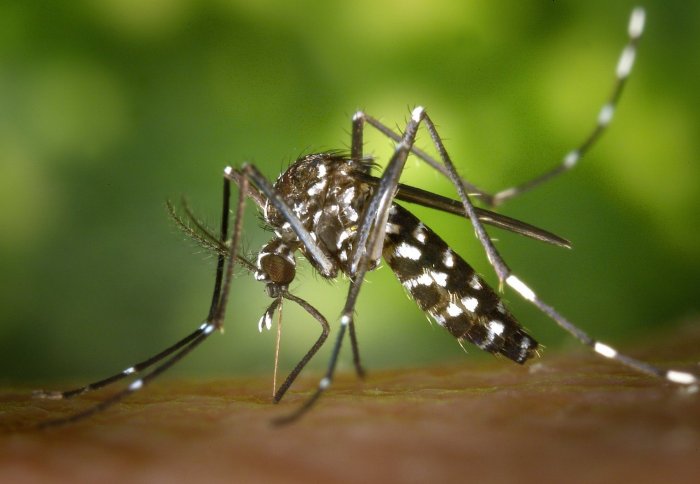Disproportionate and devastating: Professor Danny Altmann on the Zika virus

Professor Danny Altmann and Dr Rosemary Boyton (Department of Medicine) were recently awarded a grant by the MRC to investigate immune correlates of the Zika virus. The new project is a collaboration between Imperial College and leading researchers from São Paulo (Professor João Silva) and Seattle (Dr Bill Kwok).
Professor Altmann led a Q&A on the Zika virus at this year's Imperial Festival.
What is the Zika virus and why has it recently been declared a global health emergency?
The Zika virus has been around for quite a long time. It was first seen in Africa, then Micronesia, and now South America. It belongs to a family of mosquito-carried viruses, like dengue and yellow fever. For reasons that people simply aren’t sure about, in the last year and a half or so there’s been a dramatic increase in cases in parts of South America, and massively so in Brazil.
When you're in São Paulo, people in their health service are really struggling to cope. The infection in adults is kind of on a scale that they’re used to. They’re accustomed to dealing with dengue virus there, with patients having a headache, a rash, or conjunctivitis. But the other things that they’re seeing – the birth defects and microcephaly – are petrifying people and their antenatal clinics. It’s the number and suddenness of the cases that has caused Zika to be declared an emergency, and the fear for pregnant women who are wondering what’s going to happen to them as they progress through their pregnancy. It’s life-altering for them.
The Zika virus has been around for several decades. What are the factors that have resulted in it becoming an epidemic in recent months? Are they known?
It’s the unknown aspect that’s scary for people. All that we know is this hypothesis – that’s not been proven at all – that maybe Zika got carried over to South America with the [FIFA] Confederations Cup a couple of years back. It’s hard to understand how this Asian strain of virus got to South America. That’s the working hypothesis, but nobody knows.
If the common denominator for the places it could affect is an environment in which the Aedes aegypti mosquito can live and breed, then it’s billions of people in the world who could be at risk. It would include almost all of Africa and some parts of North America – Miami and New York State. It’s the way that it’s so uncharted that’s scary.
Aside from the factors that are causing the virus to spread, what are the most urgent questions about Zika that research needs to answer?
Everything! We’re part of this first round of awards that were made by the MRC and the Wellcome Trust. If you look at the twenty or so awards that they made, that’s kind of a measure of what people care about. How and why does Zika affect the nervous system so badly? How can we develop better diagnostics? How can we model what’s going on in the mosquitoes? There are a lot of scary pathogens spread by mosquitoes; if we could understand and control that better, it would be great.
There’s various quite strong candidate vaccines ready to roll out in the next year or so, and that will make a big difference. Meanwhile, there’s a whole generation of women who have become pregnant, who are going for ultrasound scans three times a week, and trying to work out what’s going to happen to them.
An article in the Guardian mentioned that, out of the 3 million births per year in Brazil, many thousands of babies would be affected. Do you think this outbreak will have a generational impact?
It’s an enormous impact if it’s your family, and it’s an enormous impact on a heroic, overstretched health service. There are certainly emotional scars for those families. However, in an enormous country with an enormous population like Brazil, in numerical terms, it won’t be quite like trying to grapple with HIV in Africa. We’re not talking tens of thousands of families. But when you look at it there [in Brazil], it’s really scary, really stretching. Just in terms of the people grappling with it on the ground, it’s enormous.
In the media, the Zika virus has been used as a lens for talking about poverty and the lack of healthcare provision in Brazil. If the Zika virus is aggravated by these factors, how do international health organisations such as the WHO work with governmental policy makers to alleviate the crisis?
In terms of global health emergencies, we’ve been through a number of them in the last 4 or 5 years, including Ebola. The epidemics are to some extent a way of signposting healthcare inequalities, and they perhaps show that if you’re going to try and deal with these crises, WHO may not be ideally configured for responding to them.
What is a better way of dealing with it?
In terms of global health and emerging infectious diseases, we need to find the tools that enable us to rise to the occasion. The impacts of Zika are disproportionate and devastating. However, with the limited experience that I’ve had of seeing what’s going on in São Paulo state, the medical staff there are truly heroic in what they manage to achieve.
Article supporters
Article text (excluding photos or graphics) © Imperial College London.
Photos and graphics subject to third party copyright used with permission or © Imperial College London.
Reporter
Ms Genevieve Timmins
Academic Services